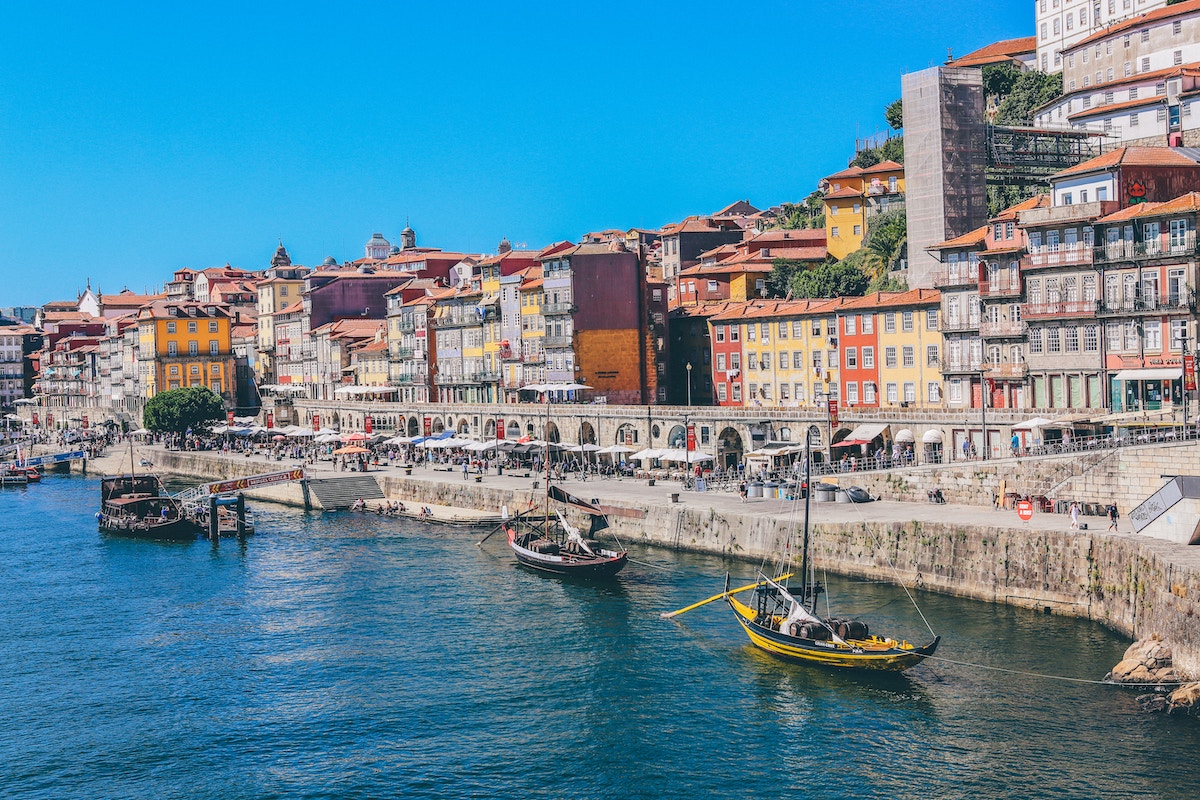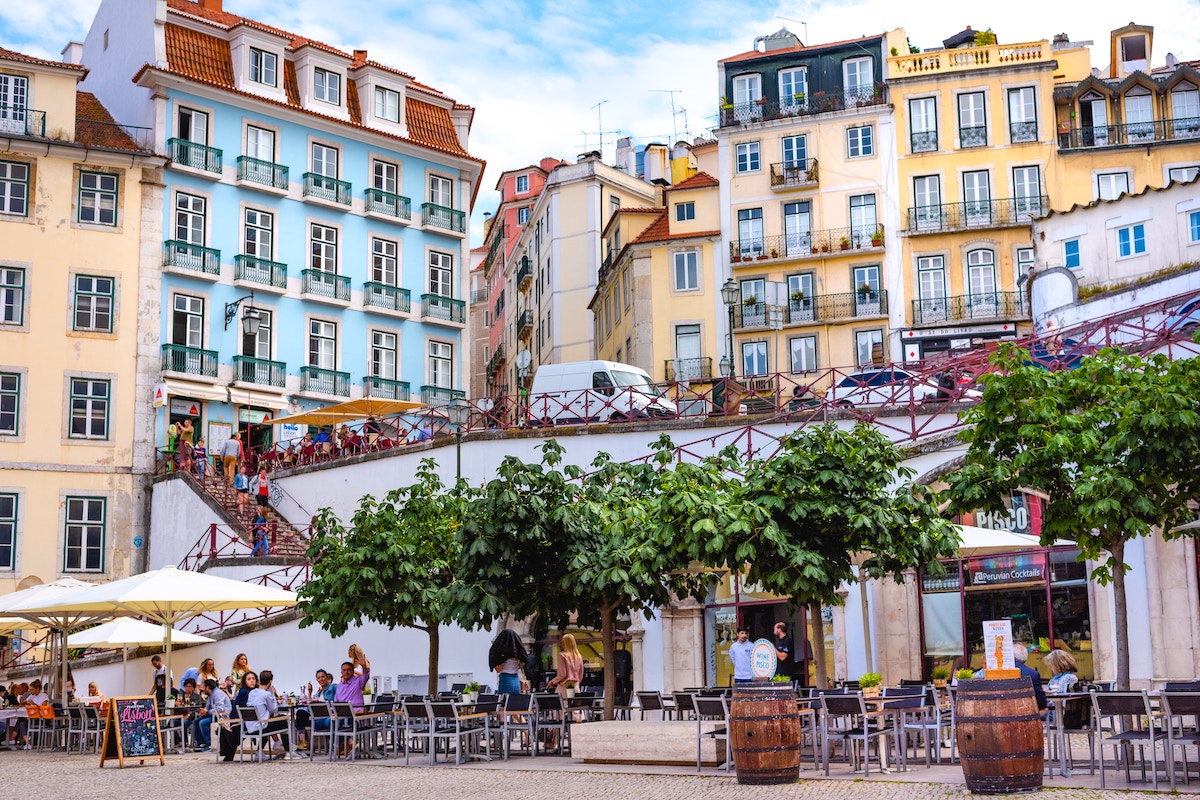
The Ultimate Guide to Portugal Visas for Digital Nomads, Expats & Retirees
By: Nahla ElKazak
Skip to Section
Article Summary
Portugal offers a wide range of visa options for travelers, remote workers, students, retirees, and entrepreneurs looking to stay short- or long-term.
This guide breaks down Portugal’s most common visa types—including Schengen, Student, Startup, Tech, and Digital Nomad visas—along with what you need to qualify, apply, and plan your move. You’ll also get a heads-up on recent legal changes, like the removal of real estate from the Golden Visa program.
- Short stays under 90 days are covered by the Schengen visa, while longer stays require specific permits based on your purpose.
- The D7 Passive Income Visa and Digital Nomad Visa are top choices for remote workers and freelancers.
- Entrepreneurs can choose between the D2 and Startup visas, depending on their business goals and funding levels.
- Permanent residency is possible after five years of temporary residence, as long as you meet income, housing, and language requirements.
- Portugal’s visa requirements vary by country and visa type—always double-check with the Portuguese consulate before applying.
Portugal, a charming country on the western edge of the Iberian Peninsula, has become an increasingly popular destination for individuals seeking to explore its rich history, stunning landscapes, and vibrant culture. Whether you’re dreaming of a short-term visit or contemplating a long-term stay, understanding the visa options and requirements is crucial to ensuring a smooth and hassle-free experience.
Throughout this article, we will delve into the details of popular visa categories, such as the Schengen Visa for short-term visits, the Temporary Stay Visa for more extended stays, the Startup Visa for ambitious business ventures, the Student Visa for academic pursuits, and the Retirement Visa for those seeking tranquility in their golden years.

Photo by Nick Karvounis on Unsplash
Who Needs a Visa to Enter Portugal
As a member of the European Union, Portugal grants visa-free entry to nationals of the EU as well as those of EFTA states, including Iceland, Liechtenstein, Norway, and Switzerland. Citizens of the European Union can travel freely within the Schengen area without a passport. However, they must request a registration certificate if they wish to stay for over three months.
Some countries outside the EU and EFTA have bilateral agreements with Portugal that exempt nationals of these countries from requiring a visa to enter Portugal. Currently, there are 61 countries with such arrangements, including Australia, Canada, Japan, the UK, and the US.
You can check the complete list of countries here. If you’re a citizen of one of these countries, you’re allowed visa-free entrance to Portugal, where you can stay up to 90 days. You must apply for a residence permit to stay longer than three months.
Short-Stay in Portugal
If you’re not a citizen of a country in the above pool, you’ll need to apply for a Schengen visa to enter Portugal.
Schengen Visa
The Schengen visa is a short-stay visa issued for tourism or business purposes. It’s also issued for family visits, airport transit, and other temporary stays. The limit for the Schengen visa is 90 days within a 180-day period. To obtain a Tourist Schengen Visa, you will need to provide the following documents:
- The visa application form
- Valid passport with over three months validity beyond your exit date and a photocopy of prior passports and visas
- A passport-size photo
- Round-trip reservation (return ticket)
- Travel medical insurance, which must be valid for your entire stay with a minimum required coverage of €30,000
- Evidence of employment:
- If you’re employed: a letter from your employer and leave permission
- If you’re self-employed: a copy of your business license, bank statement for the past six months, and income tax return.
- Proof of accommodation like a hotel reservation
- Proof of funds. This could be your bank statement for the past three months with sufficient funds covering your entire stay
You can check here for an exhaustive list of documents per country.
Portugal Temporary Residence Non-Immigrant Visas
Studying in Portugal
If you plan to study in Portugal for longer than three months, as a non-EU student, you will need to apply for Residence Permit after arriving in Portugal.
If you are an EU/EEA or Switzerland citizen, no Student Visa is required. But you still need to register your stay with the local authorities.
Required Documents:
- Valid passport
- Two recent passport-size photos
- Proof of accommodation—this can be a rental contract, a letter of invitation from a family that will host your stay, or university accommodation
- Proof of sufficient financial means
- Criminal Record Clearance: Grant SEF bureau authorization to check your criminal record in Portugal
- Letter of acceptance from your university
The exact requirements apply if you want to extend your stay for training, research, or volunteering. You can check more details here.
Portugal Youth Mobility Visa
Under a Memorandum of Understanding signed between the countries of Argentina, Australia, Canada, Chile, Japan, New Zealand, Peru, the Republic of Korea, and the United States of America and Portugal, young citizens of these countries can apply for this working holiday visa. This youth mobility visa allows you to work and travel in Portugal for up to 12 months.
If you wish to apply for a Youth Mobility visa as a US citizen, you’ll need to meet the following requirements:
- Be a US citizen
- Hold a passport valid for a period of over 12 months
- You’ll need to cover all travel expenses—this includes your return ticket and proof of enough funds to cover your expenses for the entire duration of your stay
- Obtain valid travel and health insurance to cover all your medical expenses during your stay
- Clear criminal record and allow criminal record verification
- You need to be either enrolled in a US post-secondary institution or a recent graduate (no more than a year)
The requirements can differ depending on your country. You can refer to this list for each of the nine countries’ specific requirements.
Portugal Entrepreneur Visa (D2)
If you are an entrepreneur looking to start a business in Portugal, the D2 visa is a great option. It allows you to live and work in Portugal for one year while you get your business up and running. If your business is successful, you can apply for permanent residency in Portugal after five years.
The Entrepreneur Visa aims to draw foreign investments to the Portuguese economy and create more job opportunities. You can open your company or partner in an existing company in Portugal.
Before you start your application, make sure you meet the eligibility criteria:
- Be a national of a country that is not a member of the European Union (EU), the European Economic Area (EEA), or Switzerland.
- Provide a solid business plan that outlines your business idea and how it will contribute to the country on an economic, technological, cultural, or social level.
After this is met, you can proceed to the application process, for which you will need to provide the following documents:
- Fill out a visa application form
- Passport valid for at least six months beyond the visa’s expiration date
- Two recent passport-sized photos
- Proof of financial means sufficient to support you in Portugal for one year. This would be €10,440 (~ $11,280), or 12 times the monthly minimum wage in Portugal.
- Proof of accommodation
- Clear criminal record from your country of origin
- Authorize the Foreigners and Borders Service (SEF) bureau to check your criminal record in Portugal
- Health insurance valid for your entire stay in Portugal
- Copy of your business plan
Portugal Startup Visa
Portugal is one of the few countries to offer residence through a Startup Visa. The Portugal Startup Visa is a residence visa program that allows entrepreneurs from countries outside the European Union (EU), the European Economic Area (EEA), or Switzerland to relocate to Portugal and start their businesses. The program is designed to attract innovative startups to Portugal and to help them grow and create jobs.
IAPMEI, the Portuguese Agency for Competitiveness and Innovation, manages the program. For an entrepreneur to be eligible for the Portugal Startup Visa, they must meet the following requirements:
- Have a business plan for a startup company that is innovative and has the potential to create jobs in Portugal.
- Have a minimum of €5,316 (~ $5,885) in a bank account to support yourself during your stay in Portugal.
- Establish or relocate companies and projects focused on technology and knowledge, with the goal of creating new and innovative products.
- Within five years of the incubation period, the company has the potential to generate a turnover of over €325,000 per year or have assets valued at over €325,000 per year.
If you meet these criteria, you will need to provide the following documents:
- Letter of motivation, wherein you’ll need to highlight the following points:
- Explain why your project is innovative and has the potential to grow
- Discuss how your project can be scaled to reach a larger market
- Explain why Portugal is the best place to set up your business
- A copy of your passport
- Clear criminal record issued from your country of residence
- Submit a bank statement demonstrating sufficient financial resources to support yourself and your project for at least 12 months. This amount is currently set at €5,220 (~ $5,640) and is updated annually.
- You must also attach a signed and dated declaration stating that you can transfer these funds to a bank in Portugal.
- Your resume
To apply for a Startup visa, you will need to apply here. You can use this guide to assist you through the application process.
Portugal Tech Visa
The Tech visa ties in well with the Startup Visa since startups will need to hire qualified resources to work for their companies. This type of visa allows technology companies to bring specialized talent from outside the European Union to Portugal.
Before a company can bring foreign talent on a tech visa, it must be certified through the Agency for Competitiveness and Innovation (IAPMEI).
The assessment is focused on two main factors: the market potential of the companies and their willingness to expand internationally. Companies can only hire up to 50% of their workers at the same time under the Tech Visa. However, if a company primarily operates in inland territories, this limit is raised to 80%.
How to qualify as a highly qualified worker under the Tech Visa program?
The Tech Visa program in Portugal is designed to attract highly skilled workers from countries outside the European Union to work in the country’s tech industry. To become certified as a highly qualified worker under this program, you will need to follow these steps:
- Meet the eligibility requirements for the Tech Visa program, which include having a valid employment contract. The job must be with a company registered with the Portuguese Immigration and Borders Service (SEF). You can find here the list of certified companies.
- Apply for a Tech Visa through the SEF website. You will need to provide proof of your education and work experience and other documents, such as a valid passport and a clear criminal record certificate.
- Attend an interview at the SEF office in Portugal. During the interview, you will be asked about your qualifications, work experience, and reasons for wanting to work in Portugal.
- If your application is approved, you will receive a Tech Visa, allowing you to work in Portugal for up to two years that can be renewed for successive periods of three years of residence. After five years, you may be eligible for permanent residency in Portugal.
Required Documents:
- Valid passport
- Two recent photographs
- Proof of adequate accommodation
- Authorize the Foreigners and Borders Service (SEF) bureau to check your criminal record in Portugal
You can always check the SEF requirements here for more details on the forms and the required documents.
Portugal Passive Income Visa (D7)
If you are a non-EU/EEA/Swiss citizen and have proof of recurring income, you can apply for the D7 Visa. It’s often known as the retirement visa; however, you don’t have to be retired to apply. Any proof of recurring income – like working remotely for an employer outside Portugal – can make you eligible.
You must prove that you earn at least 870 euros per month (~ $940) and that the income comes from outside Portugal. This amount is based on the minimum wage in Portugal, which is currently set at 870 euros per month. If any family members are accompanying you, 50% of this monthly amount is added per adult family member, and 30% is added for each child.
When you’re first issued the Passive Income Visa, it’s valid for four months only. Once you’re in Portugal, you must apply for a residence permit. It’ll be valid for two years, then for another three years.
You can apply for permanent residence if you meet the minimum stay requirements – a 30-month stay within a 5-year period with no absence exceeding 24 consecutive months – and a basic language test.
Required Documents:
- Fill out the required visa application
- Passport, valid for at least six months after your visa expected expiry date
- two passport-type photos
- Valid health insurance
- Clear Criminal Record
- Proof of financial resources: this can be a bank statement showing you have the minimum amount required
Portugal Digital Nomad Visa
Since the Digital Nomad Visa was formally issued in 2022, the Passive Income Visa was freelancers’ and digital nomads’ best option to stay in Portugal longer.
Due to the high traffic of digital nomads Portugal experienced during and after the pandemic, the country introduced its digital nomad visa on October 30th, 2022.
To qualify for the digital nomad visa, you need to:
- Be a citizen of any country outside the EU, EEA, and CH (Switzerland).
- Provide proof of a steady monthly income four times Portugal’s minimum wage. Currently, the minimum wage is €870 (~ $945). This means you need a monthly income of at least €3,480 (~ $3,760).
- Be self-employed or employed by a company outside Portugal.
When you first apply for the digital nomad visa, and after you get approved, you’ll get a visa valid for only four months. From there, you can apply for a 1-year visa at renewal.
Important 2025 Update: The Portuguese government has proposed changes to the nationality law that would extend the residency requirement for citizenship from 5 to 10 years (7 years for citizens of Portuguese-speaking countries). While not yet enacted, this proposal is under parliamentary review and may affect future applicants.
Required Documents:
- Fill out the National Visa Application form here
- Passport, valid for at least three months after your estimated return date, and a copy
- Two passport-sized photos
- Travel health insurance valid for the entire length of your stay in Portugal
- Clear criminal record that is not older than six months from your country of origin or the country where you are legally residing for over a year
- Proof of accommodation
- Proof of work
- If you’re employed, this would be a work contract from your employer describing the services provided and that the job can be done remotely
- If you’re self-employed, you must provide a document confirming the services provided to one or more entities (clients)
- Proof of average monthly income for the last three months with a minimum value of four times the minimum wage in Portugal (€3,480 or ~ $3,760)
- Document proving your tax residence

Photo by Paulo Evangelista on Unsplash
Permanent Residency in Portugal
Until recently, wealthy individuals could obtain permanent residency through Portugal’s Golden Visa Program, a residence-by-investment program that allowed foreigners to receive residency by buying property.
On October 7, 2023, Portugal removed real estate investments from its Golden Visa program through the ‘Mais Habitação Law’ to address housing affordability concerns. The program continues but focuses on investment funds, business ventures, and cultural support.
While the Golden Visa Program no longer offers real estate investment options as of October 2023, the program continues with other investment routes such as investment funds (minimum €500,000), cultural support (€250,000), or job creation ventures.
You can apply for permanent residence after five years if you have obtained temporary residence.
Any of the temporary residence schemes we’ve just mentioned above work. This can be the Youth Mobility Visa, Entrepreneur Visa, Startup Visa, Tech Visa, Passive Income Visa, or the Digital Nomad Visa.
To get started on your journey of making Portugal your permanent home, you’ll need to prepare the following documents for your application:
- Temporary Residence Permit: You’ll need to hold a temporary residence permit for at least five years to be eligible for permanent residency.
- Present supporting evidence of accommodation to demonstrate that you have a place to reside in Portugal.
- Financial Stability: Provide supporting evidence of stable and regular resources sufficient for your subsistence and any dependents.
- Provide two identical, color, updated passport photographs with a blank background.
- A valid travel document (passport) or a certified copy.
- Tax and Social Security Compliance: Provide supporting evidence of your compliance with tax obligations and social security contributions.
- Criminal Record Clearance: Grant SEF bureau authorization to check your Portuguese criminal record.
- Supporting evidence of knowledge of basic Portuguese.
You can find all the details here.
Ready to Travel?
In this article, we have discussed the most common visa options for traveling to and living in Portugal. We have also provided tips on choosing the right visa for your needs.
Here are some additional tips:
- Consider your purpose of travel. Are you coming to Portugal for tourism, work, or study?
- Determine your length of stay. Are you planning on staying in Portugal for a short period, or do you want to make it your permanent home?
- Research the requirements for each visa. What documents do you need to apply for a visa? What is the application process like?
- Contact the Portuguese embassy or consulate in your home country for more information.
Please keep in mind that the landscape of immigration policies may evolve over time. It is essential to stay updated with the latest information from official sources to ensure a smooth and hassle-free experience. We encourage you to do your research and explore all your visa options. With a bit of planning, you can make the process of moving to Portugal as smooth and easy as possible.
About the Author
Nahla is a freelance writer with a business background that comes from working in the IT industry for over 12 years. She has a BA in English Literature and writes about a variety of topics. When she’s not working on a project, she’s either reading, working out, or hanging out with good company. She often spends her out-of-town time hiking. You can follow her on Twitter and LinkedIn.
Featured image by Paulo Evangelista on Unsplash
Information published on this website and across our networks can change over time. Stories and recommendations reflect the subjective opinions of our writers. You should consult multiple sources to ensure you have the most current, safe, and correct details for your own research and plans.
Frayed Passport is a participant in the Amazon Associates Program, an affiliate advertising program designed to provide a means for sites to earn advertising fees by advertising and linking to Amazon.com. We also may share links to other affiliates and sponsors in articles across our website.






